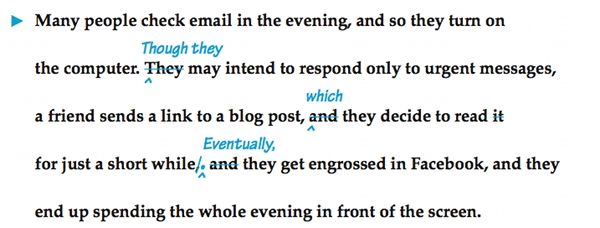25bUse subordination to distinguish main ideas.
Subordination allows you to distinguish major points from minor points or to bring in supporting details. If, for instance, you put your main idea in an independent clause—words that could stand alone as a sentence (31m)—you might then put any less significant ideas in dependent clauses, phrases, or even single words. The following sentence highlights the subordinated point:
 Mrs. Viola Cullinan was a plump woman who lived in a three-bedroom house somewhere behind the post office.
Mrs. Viola Cullinan was a plump woman who lived in a three-bedroom house somewhere behind the post office.
– Maya Angelou, “My Name Is Margaret”
The dependent clause adds important information about Mrs. Cullinan, but it is subordinate to the independent clause.
Notice that the choice of what to subordinate rests with the writer and depends on the intended meaning. Angelou might have given the same basic information differently.
 Mrs. Viola Cullinan, a plump woman, lived in a three-bedroom house somewhere behind the post office.
Mrs. Viola Cullinan, a plump woman, lived in a three-bedroom house somewhere behind the post office.
Subordinating the information about Mrs. Cullinan’s size to that about her house would suggest a slightly different meaning, of course. When you write, think carefully about what you want to emphasize and subordinate information accordingly.
Subordination also establishes logical relationships among ideas. These relationships are often specified by relative pronouns—such as which, who, and that—and by subordinating conjunctions.
COMMON SUBORDINATING CONJUNCTIONS
| after | if | though |
| although | in order that | unless |
| as | once | until |
| as if | since | when |
| because | so that | where |
| before | than | while |
| even though |
The following sentence highlights the subordinate clause and underlines the subordinating word:
 She usually rested her smile until late afternoon when her women friends dropped in and Miss Glory, the cook, served them cold drinks on the closed-in porch.
She usually rested her smile until late afternoon when her women friends dropped in and Miss Glory, the cook, served them cold drinks on the closed-in porch.
– Maya Angelou, “My Name Is Margaret”
Using too many coordinate structures can be monotonous and can make it hard for readers to recognize the most important ideas. Subordinating lesser ideas can help highlight the main ideas.

Determining what to subordinate

The editing puts the more important information—that she has saved part of the company—in an independent clause and subordinates the rest.
Subordination
TALKING ABOUT STYLE
Subordination
Carefully used subordination can create powerful effects. Some particularly fine examples come from Martin Luther King Jr.
Perhaps it is easy for those who have never felt the stinging darts of segregation to say, “Wait.” But when you have seen vicious mobs lynch your mothers and fathers at will and drown your sisters and brothers at whim; when you have seen hate-filled policemen curse, kick, and even kill your black brothers and sisters;…when you have to concoct an answer for a five-year-old son who is asking: “Daddy, why do white people treat colored people so mean?”; when you take a cross-country drive and find it necessary to sleep night after night in the uncomfortable corners of your automobile because no motel will accept you;…when your first name becomes “nigger,” your middle name becomes “boy” (however old you are) and your last name becomes “John,” and your wife and mother are never given the respected title “Mrs.”;…when you are forever fighting a degenerating sense of “nobodiness”—then you will understand why we find it difficult to wait.
– Martin Luther King Jr., “Letter from Birmingham Jail”
Avoiding excessive subordination
When too many subordinate clauses are strung together, readers may have trouble keeping track of the main idea.
TOO MUCH SUBORDINATION
 Philip II sent the Spanish Armada to conquer England, which was ruled by Elizabeth, who had executed Mary because she was plotting to overthrow Elizabeth, who was a Protestant, whereas Mary and Philip were Roman Catholics.
Philip II sent the Spanish Armada to conquer England, which was ruled by Elizabeth, who had executed Mary because she was plotting to overthrow Elizabeth, who was a Protestant, whereas Mary and Philip were Roman Catholics.
REVISED
 Philip II sent the Spanish Armada to conquer England, which was ruled by Elizabeth, a Protestant. She had executed Mary, a Roman Catholic like Philip, because Mary was plotting to overthrow her.
Philip II sent the Spanish Armada to conquer England, which was ruled by Elizabeth, a Protestant. She had executed Mary, a Roman Catholic like Philip, because Mary was plotting to overthrow her.
Putting the facts about Elizabeth executing Mary into an independent clause makes key information easier to recognize.